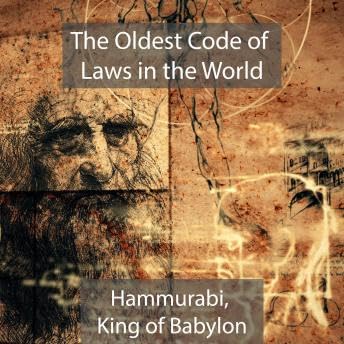
Oldest Code of Laws in the World Hammurabi, King of Babylon - Hammurabi
Failed to add items
Sorry, we are unable to add the item because your shopping cart is already at capacity.
Add to basket failed.
Please try again later
Add to Wish List failed.
Please try again later
Remove from Wish List failed.
Please try again later
Follow podcast failed
Unfollow podcast failed
-
Narrated by:
-
By:
About this listen
https://esound.space
Title: Oldest Code of Laws in the World Hammurabi, King of Babylon
Author: Hammurabi
Narrator: Kenny Davis
Format: Unabridged
Length: 1:07:32
Language: English
Release date: 04-12-2023
Publisher: Findaway Voices
Genres: Non-Fiction, Law
Summary:
'The Oldest Code of Laws in the World' is a compilation of legal codes created by Hammurabi, the sixth king of Babylon, in ancient Mesopotamia. This work dates back to the 18th century BCE and is one of the earliest known examples of a legal system in human history. The codes cover a wide range of legal issues, including property rights, inheritance, slavery, marriage and divorce, trade, and crimes and punishments. They provide insights into the social order and cultural norms of the time, as well as the role of law and justice in ancient Mesopotamia. Hammurabi's codes were based on the principle of divine authority, with the king as the ultimate arbiter of justice. They reflected the social hierarchy of the time, with different punishments prescribed for different classes of people. The codes were also designed to promote social order and stability, with harsh punishments prescribed for those who disrupted the peace. 'The Oldest Code of Laws in the World' is a fascinating glimpse into the legal and moral codes of ancient Mesopotamia, and it continues to be a source of inspiration for scholars and students of history, law, and culture. It is a testament to the enduring legacy of one of the world's greatest civilizations
No reviews yet
In the spirit of reconciliation, Audible acknowledges the Traditional Custodians of country throughout Australia and their connections to land, sea and community. We pay our respect to their elders past and present and extend that respect to all Aboriginal and Torres Strait Islander peoples today.



